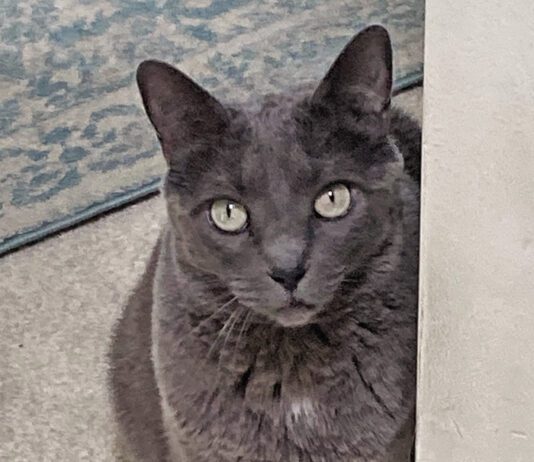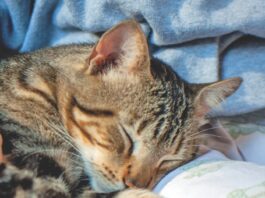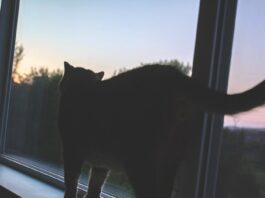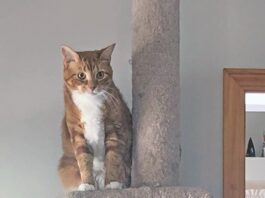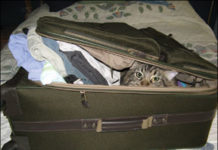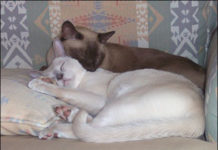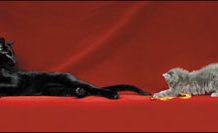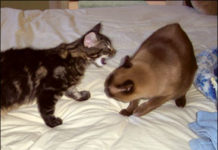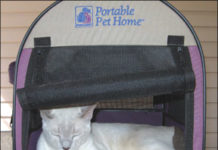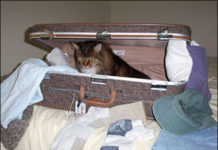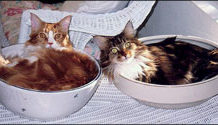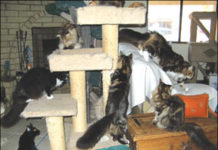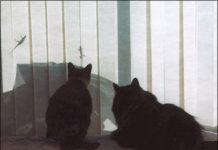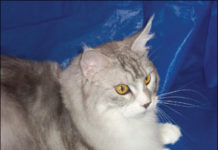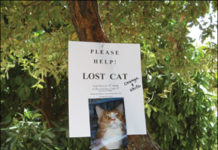Short Takes: 12/07
Rushed to the Veterinary Teaching Hospital at Kansas State University, the year-old cat had been coughing, vomiting and suffering abdominal pain. When all was said and done (yes, she survived, thanks to surgery) the cat was the subject of a report, "Diagnostic imaging for linear foreign bodies in cats," in the journal, Veterinary Medicine (Vol. 102, Issue 8). The cats owners got lots of pictures - from imaging techniques that included survey radiography, compression radiography, ultrasonography and positive contrast upper GI radiography. And veterinary science learned which techniques work best: compression radiography (something like a mammogram of the abdomen) and ultrasound.
Is Your Cat Lonely?
It seems that nearly every week, a concerned cat person asks me that question. It could be that one cat in the household has recently passed away. Sometimes, a person has a bit more love to give, and just wants to share her home with more than one cat. And most often, people who work long hours hope that by adopting another cat, the original cat wont need to spend those hours alone. Unfortunately, there is no simple answer to that seemingly simple question. For years, we described cats as asocial. They hunt alone, so it was assumed that they lived alone and wanted to keep it that way. Research has revealed that, indeed, some cats are not very social. They are loners and do not choose to spend their time in the company of others.
Ask Elizabeth: 11/07
Dear Elizabeth, I cant help feeling envious of the absolutely beautiful photos that have been taken of you. You are clearly a stunning cat of exquisite beauty, but I wonder how the photographers at the Feline Health Center have been able to capture your soul in their photos. I would dearly love to have some similar photos of my equally beautiful cats, but all I get are fuzzy, out-of-focus shots of their tails as they flee the room, or photos where their eyes are red and they look devilish. Do you have any tips that you could share?
The Aggressive Kitten
Who doesnt love a kitten? They're so soft when we just need something to touch. They're so funny to watch after a hard day at the office. They're so easy to entertain when we want to relax. Whenever we adopt a kitten, we can expect to be the recipients of small "mistakes." There may be an attention-seeking swat that tears our pantyhose. Or a scratch when the toy moves out of reach faster than our arm does. Maybe even a nip when we attempt to play cat and mouse using our hands as the target.
The Stress-Free Vet Visit
Rubber gloves, stethoscopes, needles, white coats …… the mere thought of going to the doctor or dentist can send shivers up the spine of many patients. Our feline friends are no different. Luckily, cats dont consult a calendar in the days or weeks before a trip to the veterinarian, so they are spared a lot of needless time worrying beforehand. But make no mistake about it: Your cat will know somethings up the minute she sees the cat carrier in your hand.
The Attention-Hungry Cat
Bandit sits on a white plastic grocery sack (with the handles slit so she doesnt become trapped). Sitting on a sack is her persons cue that Bandit wants to play a game. Growltigger sits on papers in front of the computer screen whenever his owner is trying to type. Ziba jumps on newspapers spread out on the dining room table when someone is reading them there. Thomas Mountain Lion climbs on bags of recycled paper that make crunching noises when he moves around on them. Place a throw rug on the floor, even if its on top of wall-to-wall carpet, and Migraine will sit on it. Place a folded fuzzy blanket at the end of the bed, and Merry stretches out on it. Stacks of books, stacks of clean clothes, stacks of reports from your tenth grade history class - set them on the floor, and your cat is likely to perch on them.
A Feline Mystery
You walk into a room and see a little wet spot on the floor, far from any sink or faucet. Or perhaps you find a more solid surprise. Who was responsible for this deposit? If you have ever lived with more than one pet at a time, then you have surely been in this position. Your assignment: to solve The Mystery of the Puddle. Was it the dog? Was it the cat? And if you live in a multicat household, which cat did the deed?
Ask Elizabeth: 10/07
It all started innocently enough, when he started feeding the strays in the neighborhood and took in a pregnant cat, which soon gave birth to six kittens. Then the neighbors started coming to him with stray kittens they found. He meant to find them all homes of their own, but good homes were hard to find. Now, he has so many cats that he cant afford to have them neutered (which means the population has been growing astronomically). Theyre not receiving any medical care, so some of them are sick, and its all he can do just to feed them each day. The neighbors are trying to have him evicted and I cant say I blame them. I dont know how to help him, but I do know something needs to be done!
“Gifts” From Your Cat
Cats are born with a chasing and hunting instinct, but not necessarily the skill to go along with it. The mother cat teaches her kittens to kill and eat prey. (Indoor cats may chase and kill mice, but rarely eat them.) The lessons start when the kittens are about four weeks old. The mother cat begins by bringing home dead mice or other prey and eating them in front of the kittens. The kittens soon catch on and join in. Next, the mother cat brings home dead mice and the kittens eat on their own.
Do You Have a Watchcat on Patrol?
Over the years, I have seen a handful of cats that exhibited aggression toward visitors to the home. If you have never witnessed a cat that thinks he is a German shepherd guarding a door, let me assure you: It is a scary sight to behold. I am referring to a cat that, upon hearing the doorbell, marches to the door, stares as guests enter, and proceeds to demonstrate postures that clearly reflect the message: "Go home, stranger."
Your Cat’s Whiskers
The old-fashioned term "the cats whiskers" means "the height of perfection" or "first-rate." Popular in the 1920s, this expression, along with "the cats meow," referred to the daring flappers described as "impossible to shock." While the term is American in origin, people have disagreed over who deserves credit for coining it. The lexicographers William and Mary Morris believe both "cat" expressions originated in girls schools. Other sources say American sportswriter and cartoonist Thomas Dorgan (1877-1929) invented the expression at the turn of the 20th century.
Short Takes: 08/07
For some reason, this scientific report made us think of the "whoosh!" sound when a can of coffee is opened: "Use of vacuum-assisted closure for management of a large skin wound in a cat" (Journal of the American Veterinary Medical Association Vol. 230, No. 11). The relatively new technique - pioneered in human surgery cases and tested recently by veterinary surgeons on a nine-month-old cat that was struck by a car - calls for wrapping the wounded area in sterile plastic foam. Then a vacuum pump sucks out the air between the skin and the foam blanket so that the animal, essentially, was shrink-wrapped. The treatment pulls skin together until it heals (the cat needed skin grafts for its serious injury), helps keep out infection and stabilizes the body temperature.

